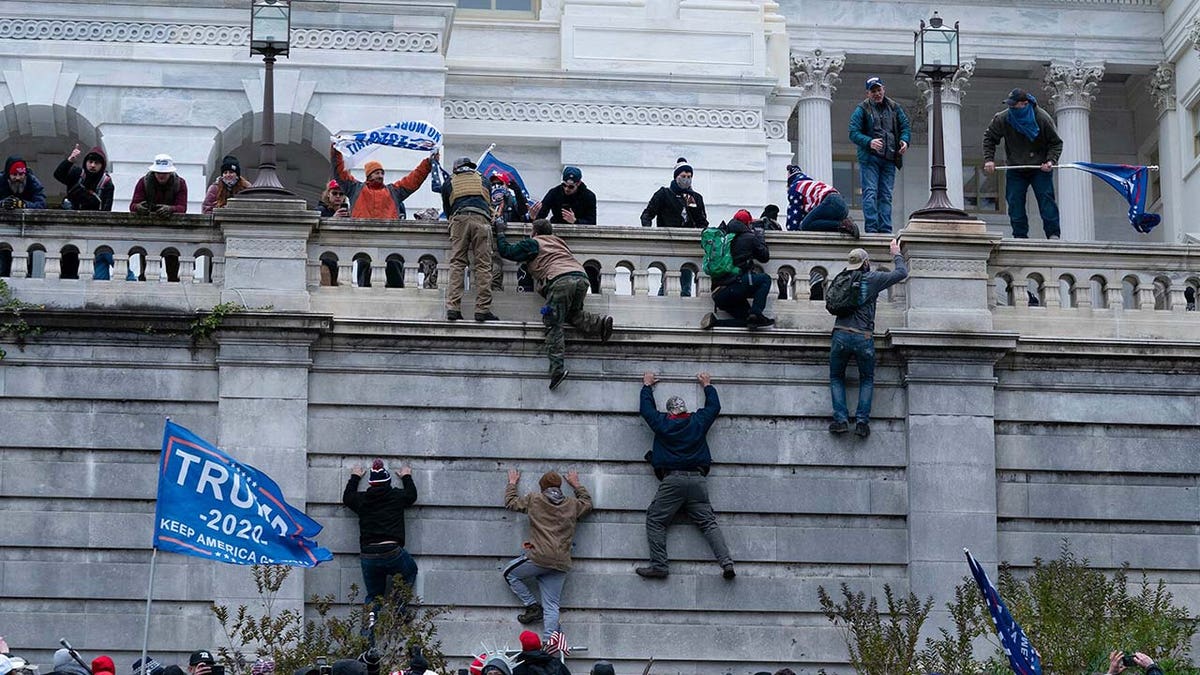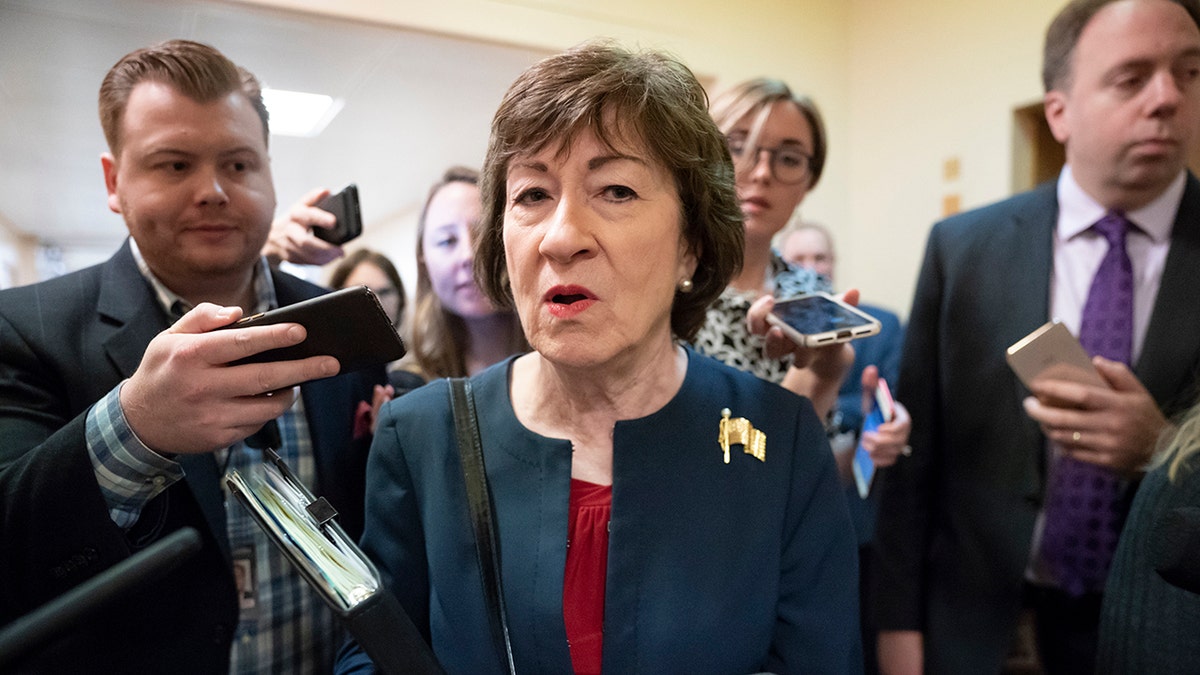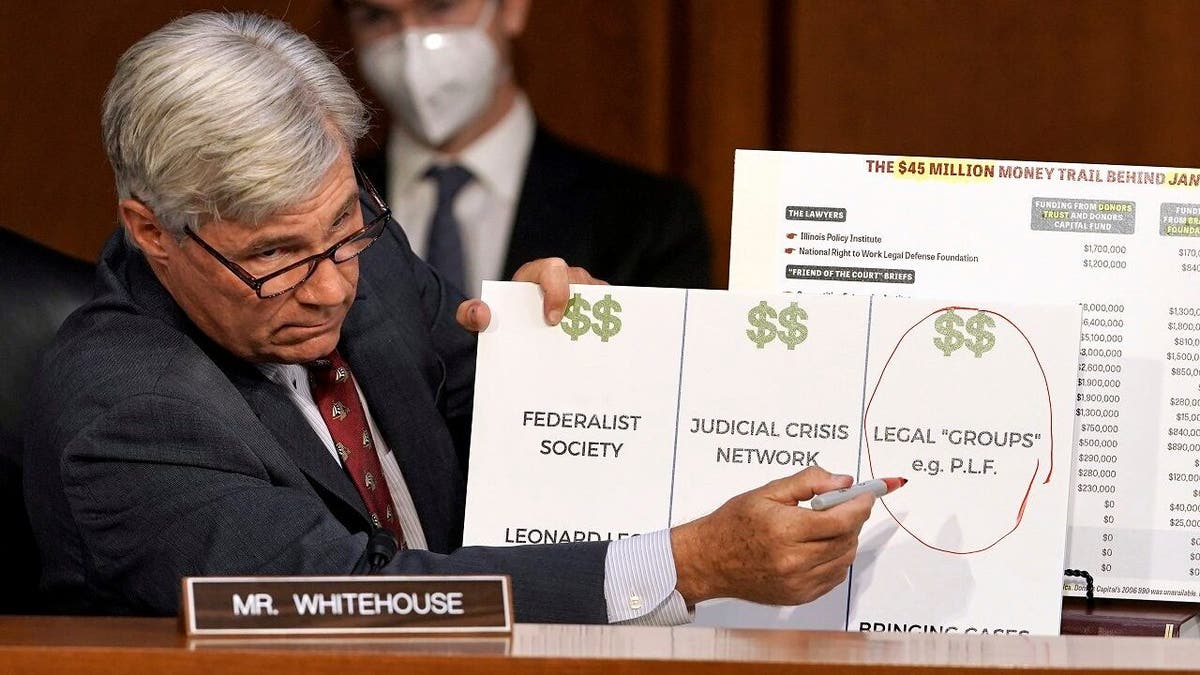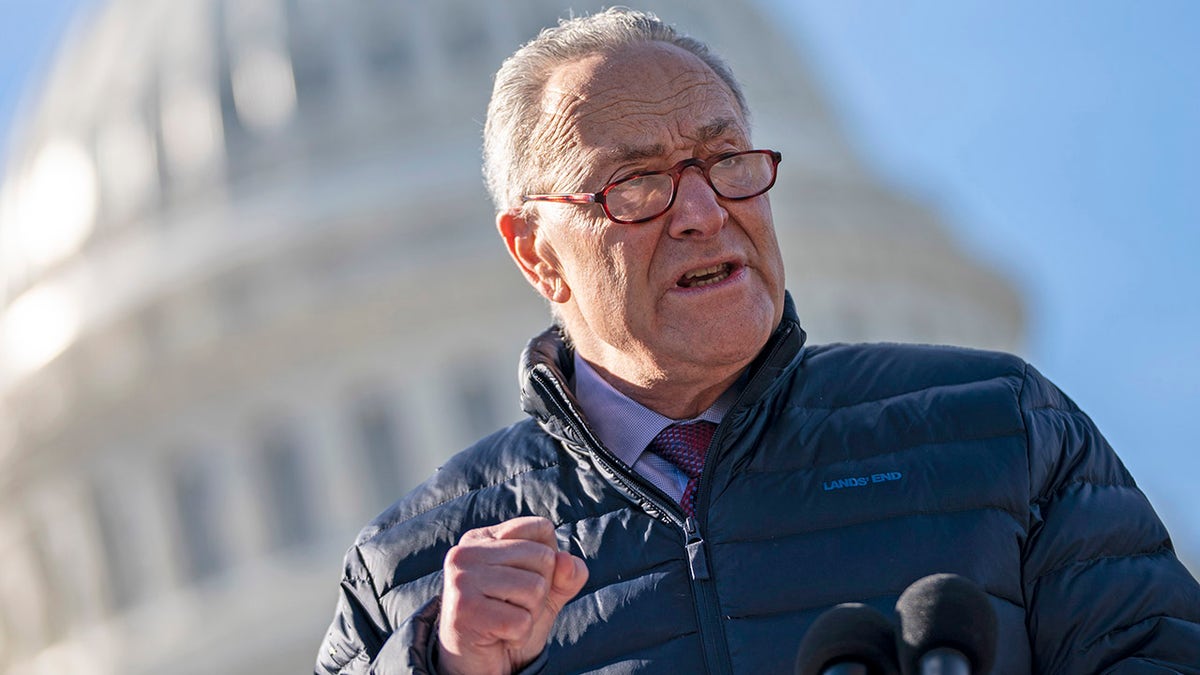The outcome of the impeachment trial of former President Donald Trump is almost certainly predetermined -- that he will be acquitted.
It's already clear what the arguments from the House impeachment managers and Trump's defense team will be -- they made them in briefs submitted to the Senate before the in-person part of the trial started Tuesday.
But between the start of the arguments on merits Wednesday and the nearly inevitable acquittal of Trump stands one giant unknown that could significantly extend the trial -- whether there will be witnesses.
"On the question of witnesses, we have no news for you on that this morning," a senior aide on the impeachment managers' team said Tuesday. "I'll just say you're going to see a devastating case against Trump in the managers' presentation in the coming days."

Supporters of President Donald Trump climb the west wall of the the U.S. Capitol on Wednesday, Jan. 6, 2021, in Washington. (AP Photo/Jose Luis Magana)
If witnesses are called, then the Senate, according to the trial framework agreed upon by Republicans and Democrats, as well as the impeachment managers and Trump's defense team, would vote on whether the Senate will subpoena witnesses.
Sens. Mitt Romney of Utah and Susan Collins of Maine were the only Republicans to vote to hear the House's witnesses during Trump's Senate trial last year. They weren't enough to get the majority required to bring in witnesses, but now the Senate is split 50-50 on party lines.
It's not clear how Collins would vote on impeachment witnesses this time around. Romney's office did not respond to a request for comment from Fox News on Tuesday.
Fox News also asked the offices of Sens. Ben Sasse, R-Neb.; Lisa Murkowski, R-Alaska; Bill Cassidy, R-La.; and Pat Toomey, R-Pa., if they would vote to allow witnesses in the Senate if they are requested. Those are the senators who voted with Collins, Romney and all Democrats on Tuesday to allow the impeachment trial to move forward as constitutional.

In this Nov. 6, 2019, file photo, Sen. Susan Collins, R-Maine, is surrounded by reporters as she heads to vote at the Capitol in Washington. (AP Photo/J. Scott Applewhite, File)
Toomey's office declined to comment on a hypothetical. The others did not respond. The office of Senate Minority Leader Mitch McConnell, R-Ky., also did not respond to a request for comment.
There's been no further indication on if the impeachment managers will subpoena witnesses as of Wednesday. But if they do, it could lead to a trial that lasts days longer or even more. If the Senate votes to subpoena witnesses, both sides would be allowed to depose the witnesses, something that will likely be done in private off the Senate floor. There will also be a "discovery" process. Then the Senate will decide if those witnesses will be allowed on the Senate floor to testify.
Trump lawyer Bruce Castor told Fox News Wednesday that the Trump legal team does not intend at this point to call witnesses. But he added that if the House managers do call witnesses, and the Senate allows them, that he and his colleagues would fully participate in that process.
TRUMP 'BEYOND ANGRY' WITH IMPEACHMENT DEFENSE TEAM'S SHOWING: SOURCES
"I believe that if it is the will of the Senate that witnesses are to be called I think I can say with certainty that we will call witnesses and I will cross-examine their witnesses," Castor said. "I would rather not reveal who I am thinking."
That lengthy process is something neither party is necessarily interested in at this point. Republicans do not want to continue to have Trump's post-election conduct thrown in their face and Democrats want to get on with President Biden's agenda.
Notably, Democrats, who uniformly insisted that witnesses be called in Trump's last impeachment trial, have not vocally pushed for that this time around.
When asked if he will support witnesses if House managers call them, representatives for Sen. Sheldon Whitehouse, D-R.I., were noncommittal.

Sen. Sheldon Whitehouse, D-R.I., speaks during a confirmation hearing for Supreme Court nominee Amy Coney Barrett before the Senate Judiciary Committee, Tuesday, Oct. 13, 2020, on Capitol Hill in Washington. (Greg Nash/Pool via AP)
"The senator will support whatever is necessary to get to the truth," a spokesperson said.
The office of Senate Majority Leader Chuck Schumer, D-N.Y., did not respond to a request for comment. Last year, Schumer led the charge for witnesses in the first Trump impeachment trial.
"Democrats believe that a fair trial means that all the relevant facts come out, and witnesses and documents are part of that trial. Whoever heard of a trial without witnesses and documents? It’s unprecedented," he said on Jan. 7, 2020.
There is of course a difference between the accusations leveled against Trump in this impeachment as compared to the previous one. In Trump's first impeachment, the former president was accused of pressuring a foreign leader for political favors during a nonpublic phone call, then executing a shadow influence campaign to withhold aid from the country. Now, Trump is accused of making a series of public statements culminating in a fiery speech that led to an attack on the Capitol, which senators witnessed and was broadcast live on television.
"Imagine if the Ukraine call were streamed on the Internet," Sen. Brian Schatz, D-Hawaii told Politico.
But there were multiple House hearings with witnesses before Trump's first impeachment. They were broadcast live for days. And the transcript of the call was on the internet.

Senate Majority Leader Chuck Schumer (D-NY) speaks during a press conference about student debt outside the U.S. Capitol on February 4, 2021 in Washington, DC. (Photo by Drew Angerer/Getty Images) (Getty Images)
Fox News also asked the offices of Sens. Dick Durbin, D-Ill.; Bernie Sanders, I-Vt.; and Ron Wyden, D-Ore.; if they would support bringing witnesses in Trump's trial if the House impeachment managers request them. Their offices did not respond.
Still, most Democrats are expected to support allowing witnesses at the trial if they are requested.
"As a former prosecutor ... I let the trial lawyers determine their own trial, how to present their evidence. And if the House managers, or for that matter the defense lawyers, feel they need witnesses to present absolutely critical evidence, they should be permitted to do so," Sen. Richard Blumenthal, D-Conn., said on ABC News.
What's not clear is if the right cocktail of votes from most Democrats and a handful of Republicans is there to allow witnesses if they are requested. Some speculation on potential witnesses has included individuals who were with Trump as the rioters ransacked the Capitol, Georgia Secretary of State Brad Raffensperger or even the rioters themselves.
The House impeached Trump on Jan. 13, one week after Trump assembled a large crowd of his supporters for a rally in Washington D.C., just before Congress was set to certify Biden's victory in a joint session. There, Trump repeated the false claims he'd made for months that he'd won the presidential election as he and his allies told the crowd they'd need to "fight" or they would not "have a country anymore."

In this Jan. 6, 2021, file photo rioters loyal to President Donald Trump try to break through a police barrier at the Capitol in Washington. (AP Photo/John Minchillo, File)
Trump specifically told the rallygoers to march "peacefully and patriotically," but those who supported his impeachment for "incitement of insurrection" said the one comment did not outweigh months of comments from Trump and his allies leading up to Jan. 6.
CLICK HERE TO GET THE FOX NEWS APP
About one hour after Trump's remarks concluded, the pro-Trump mob breached the Capitol, forcing the House and Senate to pause their debate on counting electoral votes as lawmakers went into hiding. The rioters chanted, "hang Mike Pence," and more.
Trump's lawyers say those pushing his impeachment took his words out of context and that he was acting within his First Amendment rights. They also say the House article is improperly written, accusing him of a variety of offenses when each article is supposed to be just one action.
House impeachment managers meanwhile are expected to argue Wednesday that Trump "engaged in a single course of impeachable conduct in inciting an insurrection on January 6."
Fox News' Caroline McKee, Chad Pergram and Brooke Singman contributed to this report.













































